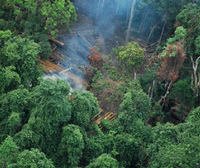Up to $1.7 billion a year in oil money is set to flow into impoverished Cambodia, where 35 percent of the population lives under $1 a day and where this year's national budget is only $1.8 billion. Yet in a country ranking a dismal 166 out of 180 on Transparency International's annual corruption rankings, allegations of nepotism and cronyism are already surfacing around the country's nascent oil sector, set to start production in 2012. Critics, like London-based watchdog Global Witness, claim the makings of a "resource curse" are in place, wherein a political elite will siphon profits that should be used to address poverty.
The International Monetary Fund initially estimated the newly found oil reserves, discovered in 2005, at 2 billion barrels, while energy giant Chevron forecast a more modest 400 million barrels. Amendments to a 1991 oil law subsequently placed the fields under the jurisdiction of the Cambodian National Petroleum Authority (CNPA), controlled directly by Prime Minister Hun Sen and his deputy, Sok An, with little parliamentary oversight. Global Witness claims the CNPA is rife with secrecy, its administrators regularly withholding documents and denying telephone usage to employees. That's in addition to millions of dollars, paid by companies to secure oil blocks, that aren't showing up in the government's revenue reports.
The developments follow a pattern that has emerged in other countries that have fallen prey to oil curses, such as Nigeria, Venezuela, and Iraq. Ou Virak, head of the Cambodian Center for Human Rights, argues that Cambodia has much in common with those three countries, in particular the fact that all government bodies and revenues are under the control of a few people. One Asian Development Bank consultant even labeled the CNPA a part of Sok An's "empire" (which also includes the corruption-rankled genocide tribunal).

